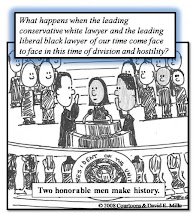
Reporting at the Wall Street Journal blog, which can be accessed on our sidebar links, thoughtful blogger Dan Slater reports that a controversial Confederate flag case has been decided in Tennessee, and I for one am not too happy with the majority ruling.
The recap: A high school principal in Tennessee told students they couldn’t have “Rebel flags” or symbols of flags on their clothes. Three students, who felt that the policy unconstitutionally interfered with their ability to express their southern heritage, sued. In August, the Sixth Circuit Court of Appeals upheld a grant of summary judgment in favor of the school. This bugged me, as I am a student of Tinker vs. Des Moines, the landmark First Amendment case that struck down a school ban on armbands to protest the Vietnam War.
The court cited testimony that racial tensions — including racist and threatening graffiti and physical altercations between African-American and white students — comprised the context for the clothing ban. The court distinguished the case from Tinker and its progeny.
Last week, the Sixth Circuit denied the students’ petition for rehearing en banc.
In dissent, Judge Danny Boggs wrote:
'It should be emphasized that no disruption of any sort was directly associated with the display of symbols, in that the persons displaying the symbols are not alleged to have been involved in any physical incidents, nor to have instigated even any verbal ones. . . Consider also that one of the plaintiffs to this case, who was involved in a verbal confrontation with another student, testified that after he was called a “dumb redneck,” he did not respond because “it’s not worth my time beating somebody’s butt because they’re just acting stupid.” . . . Though a confrontation short of a violent altercation could amount to a disruption within the meaning of Tinker, not every disagreement or incident of name-calling will support the suppression of speech. And it should be left to a jury to determine whether this disagreement both constitutes a disruption and was sufficiently related to the Confederate flag to justify a ban.'
The facts of the case are delicate but it seems to suggest to me that my behaviour should be governed by another reaction’s to it. Take a look at the case and let me know what you think.
I can totally relate personally with those who wanted to deny the students' the right to wear that shirt. I know exactly what they were feeling. My very first roommate at Hofstra University in 1967 was a kid from the deep South. When I walked into the dorm for the first time, he had already been there for a day, and set up the room. Above his bed, he had hung a large Confederate flag. I told him that there was no way I was living with that in my room; that it was racist and wrong and offensive. We wound up living together for less than a week. I hated the guy.
Today, even though I would not make him my friend, I would represent him as my client. I guess that is the difference forty years makes.
-Norm
-Norm
































I agree, Norm. There are many religions which promote bigotry and hate against groups of individuals. While it is a Parent's Right to raise their children in such an environment, and I wouldn't want my child associating with such individuals, it IS their Right to raise their children that way.
ReplyDeleteAll too often, however, are those groups who try to dictate what others should or should not believe or what other Parents should or should not consider appropriate for their children. The justification is always that the mere existance of something violates THEIR Rights.
In NC, an Anti-abuse (Anti-bullying) law was blocked this past summer because religious groups claimed that the wording violated their Religious Rights. What Rights? Supposedly, their Freedom Of Speech Rights. But, in fact, the laws were written to oppose verbal, mental, physical, and/or sexual abuse against others. Nevertheless, the bill was sent back, supposedly for further review.
This happens all too often in schools. Want a club where students voluntarily join and attend? Sorry, have to have religious approval by those who wouldn't even give written approval for their own children to join, so NO ONE else's children should have the Right to join.
The downside to the argument, however, is communication. Even if a student says nothing or takes no other action, an image on a shirt or other visible piece of clothing IS a form of communication (we tend to say "verbal", but other forms of communication should apply such as written, American Sign Language, and even visible imagry to name a few).
I, as a Parent, should have the Right to decide what is, or is not, exposed to my child. In a Public School, with a large diversity of... well... everything... that's not so easy. I could list material that, from my own perspective, was "good" or "bad" that just being seen would mean my child being "exposed" to. Just as someone else could do the same and their perspective of "good" vs "bad" may be different or completely opposite.
Sadly, that leaves little middle ground for Public School students. How does one fight for both individuality and the Right of individuality for the students versus what each Parents wants their child exposed to?
A Parent can only truly have full control over what their child is exposed to by Homeschooling and hiring (or not) potential tutors and babysitters. One doesn't have that level of control in Public School or even Private School. Even the beliefs of school personnel may very well contradict what you believe to be appropriate or not for your child. And what can you really do about that?
What you are left with is having computers and robots run the schools in a sterile environment that may, in fact, banish all forms of art, literature, and other courses that inspire imagination which would lead to individual thoughts and opinions on a great many subjects which would lead to the need to express those thoughts and opinions in a variety of ways.
It sounds extreme, but the truth is, to have REAL diversity, and REAL individuality, one will find themselves having to allow for being both offensive and offended for a variety of reasons.
The legal system will never be the place to solve this problem because, as you can see, participants in the legal system have their own beliefs as to what is or is not appropriate for other people and their children. And those beliefs will always be different, whether in a small or large way.
Andrew